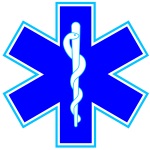Pediatric Ventricular Fibrillation or Pulseless Ventricular Tachycardia: Difference between revisions
From Protocopedia
mNo edit summary |
No edit summary |
||
| (2 intermediate revisions by the same user not shown) | |||
| Line 8: | Line 8: | ||
*Allow for complete chest recoil between compressions. | *Allow for complete chest recoil between compressions. | ||
*Minimize interruptions | *Minimize interruptions | ||
*Assist ventilations with [[ | *Assist ventilations with [[Oxygen|OXYGEN]] @ 100% via BVM. DO NOT HYPERVENTILATE | ||
* INTUBATE and establish peripheral IV or IO line as able. | * INTUBATE and establish peripheral IV or IO line as able. | ||
* DEFIBRILLATION @ 2 J/kg. | * DEFIBRILLATION @ 2 J/kg. | ||
| Line 15: | Line 15: | ||
'''''Refer to Handtevy System for specific medication administration based on weight / length.''''' | '''''Refer to Handtevy System for specific medication administration based on weight / length.''''' | ||
* [[ | * [[Epinephrine|EPINEPHRINE]] 1:10,000 (0.1mg/ml) 0.01 mg / kg IV /IO | ||
* Repeat [[ | * Repeat [[Epinephrine|EPINEPHRINE]] 1:10,000 (0.1mg/ml) 0.01 mg / kg every 3 - 5 minutes of continued arrest. | ||
| Line 24: | Line 24: | ||
* If hypovolemia suspected, fluid bolus 20 ml / kg. | * If hypovolemia suspected, fluid bolus 20 ml / kg. | ||
* [[ | * [[Amiodarone|AMIODARONE]] 5 mg/kg, IVP or IO - refer to Broselow Tape for patient specific dose. | ||
:'''OR''' | :'''OR''' | ||
* [[ | * [[Lidocaine|LIDOCAINE]] 1.0 mg/kg IV / IO. | ||
| Line 33: | Line 33: | ||
* After 10 minutes, [[ | * After 10 minutes, [[Lidocaine|LIDOCAINE]] 1.0 mg/kg IV / IO. | ||
* DEFIBRILLATION @ 8 J/kg. Continue CPR immediately. | * DEFIBRILLATION @ 8 J/kg. Continue CPR immediately. | ||
* If rhythm converts, follow appropriate Practice Parameter | * If rhythm converts, follow appropriate Practice Parameter | ||
'''''If V-Fib converts to a pulse-producing tachycardic rhythm, follow with [[ | '''''If V-Fib converts to a pulse-producing tachycardic rhythm, follow with [[Lidocaine|LIDOCAINE]] boluses IVP.''''' | ||
[[Category:Pediatric and Obstetrical|0703]] | [[Category:Pediatric and Obstetrical|0703]] | ||
Latest revision as of 14:38, 24 April 2020
Section 7 - PEDIATRIC / OBSTETRICAL
7.03 PEDIATRIC VENTRICULAR FIBRILLATION /PULSELESS VENTRICULAR TACHYCARDIA
- Initiate 5 cycles of high quality (30:2) one-rescuer or (15:2) two-rescuer CPR for approximately 2 minutes to allow blood to circulate and continue throughout resuscitation, minimizing interruptions.
- Maintain rate of between 100-120 compressions per minute.
- Maintain compression depth of at least 1/3 of the depth of the chest.
- Allow for complete chest recoil between compressions.
- Minimize interruptions
- Assist ventilations with OXYGEN @ 100% via BVM. DO NOT HYPERVENTILATE
- INTUBATE and establish peripheral IV or IO line as able.
- DEFIBRILLATION @ 2 J/kg.
- Proceed to next step only if V-Fib / Pulseless V-Tach persists.
- If rhythm converts, follow appropriate Practice Parameters.
Refer to Handtevy System for specific medication administration based on weight / length.
- EPINEPHRINE 1:10,000 (0.1mg/ml) 0.01 mg / kg IV /IO
- Repeat EPINEPHRINE 1:10,000 (0.1mg/ml) 0.01 mg / kg every 3 - 5 minutes of continued arrest.
- DEFIBRILLATION @ 4 J/kg. Continue CPR immediately.
- If rhythm converts, follow appropriate Practice Parameters.
- If hypovolemia suspected, fluid bolus 20 ml / kg.
- AMIODARONE 5 mg/kg, IVP or IO - refer to Broselow Tape for patient specific dose.
- OR
- LIDOCAINE 1.0 mg/kg IV / IO.
- DEFIBRILLATION @ 6 J/kg. Continue CPR immediately.
- If rhythm converts, follow appropriate Practice Parameters
- After 10 minutes, LIDOCAINE 1.0 mg/kg IV / IO.
- DEFIBRILLATION @ 8 J/kg. Continue CPR immediately.
- If rhythm converts, follow appropriate Practice Parameter
If V-Fib converts to a pulse-producing tachycardic rhythm, follow with LIDOCAINE boluses IVP.
